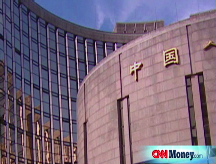Credit freeze and your paycheck
Businesses are finding it hard to get credit to fund their daily operations. But experts question the impact on the wider economy.
NEW YORK (CNNMoney.com) -- Is it even harder now for businesses to get credit from banks? No question.
Does that mean that the American economy will crumble within weeks if the government's $700 billion bailout of Wall Street doesn't pass? No telling.
In the wake of last week's demise of Lehman Brothers and last-minute government bailout of American International Group, the credit markets have all but frozen. What this means for businesses is that they are having a tougher time just getting funding even for their day-to-day operations, never mind securing loans for expansion projects.
While the credit crunch is more than a year old already, two things have changed in recent weeks. First, investors have cut off a major financing source of large corporations by shying away from buying their commercial paper, or ultra short-term debt.
Also, since banks are now holding onto their money even more, they are either not extending lines of credit to companies or are instituting more onerous terms. Businesses of all sizes depend on this funding to buy supplies and inventory, make payroll and extend credit to customers while waiting for payments to come in.
Most businesses don't keep much cash on hand. They rely on banks' lines of credit to cover them until they get paid by their customers.
What does that mean for companies and their employees? Economists are divided, with some predicting dire consequences and others saying most can weather the financial storm for now.
If businesses can't access funding on reasonable terms, they will likely either raise prices or curtail their operations or both, said Ken Goldstein, economist with The Conference Board, a business research organization. This could send the economy into a tailspin as everyone from the corner bagel shop to the local hospital to the largest manufacturer suffers.
"If they're lucky they get the money, but at a much higher price, which they then pass on to you and me," said Goldstein, adding the economy could start crumbling within weeks under that scenario. "If they don't get the money, they might have to close their doors."
For each business that can't get funding, the impact is felt by many, experts said. The company may curtail credit to its customers, forcing them to pay more cash up front. It won't buy as much from suppliers or invest in upgrading its operations. And it may have to cut its workforce, or at least postpone expanding it.
Both struggling and growing companies feel the squeeze.
"Bank capital is the lubricant that allow them to run their operations," said Amiyatosh Purnanandam, assistant professor of finance at the University of Michigan. "Even a profitable company can't undertake projects because it has no money."
Other experts, however, say that most companies can get by for the time being. Credit lines, they point out, usually last for at least a year so banks can't start pulling them willy-nilly unless the terms are broken. And business can better survive a credit squeeze than a major downturn in consumer spending, which has yet to materialize.
"It's not the disaster they are making it out to be," said Amir Sufi, assistant professor of finance at the University of Chicago Graduate School of Business.
Some companies, meanwhile, are coming up with inventive ways to circumvent the funding freeze.
Take Drew Greenblatt, president of Marlin Steel Wire Products in Baltimore.
He recently asked his bank to add $175,000 to his line of credit so he could purchase steel for two large customer orders. The bank said he could get the funding, but only if he first put $175,000 into a certificate of deposit.
"We can get the money but the terms are so silly it just doesn't make sense," he said. "It's very frustrating."
So instead, Greenblatt is demanding more cash from customers in advance. Those clients with average credit ratings now have to put down a 50% deposit on their orders, whereas two months ago they didn't have to pay anything upfront.
"We're trying to make sure what's happening in the credit markets doesn't impact us," Greenblatt said. "We will be able to ratchet up sales and not have to deal with the bank." ![]()





